Ensuring access to essential supplies in the wake of COVID-19 in Europe and Central Asia
Date:
In the immediate aftermath of crises such as the COVID-19 pandemic, women and girls – especially those who are poor and vulnerable – need immediate and essential supplies. In the current context, the most urgent products have been facemasks, hand sanitizer and other personal protective equipment, and hygiene kits have been particularly necessary to allow women with reduced incomes and mobility to withstand long periods in lockdown.
In Moldova, UN Women has distributed essential products to women survivors and shelters, coveralls and personal protective equipment to social workers, as well as food, hygiene and educational packages to 70 localities. In North Macedonia, UN Women is donating non-perishable food and hygiene products to single-parent families, registered survivors and women with disabilities. In Serbia, mobile teams are helping elderly and vulnerable women, while panic buttons apps and helplines assist survivors and overburdened caregivers, online green markets allow women farmers to sell their products, and online consultations and studies are underway to assess the impacts of COVID-19 for women. Meanwhile, in Kyrgyzstan, women leaders have been sewing face masks for frontline workers and vulnerable women, while personal hygiene and disinfection products are being distributed across the country.
In Moldova, UN Women is distributing essential products and protective equipment to social workers and organizations working to prevent violence against women
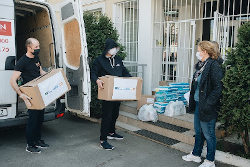
With support from the Government of Sweden, UN Women and UNFPA delivered essential products to 250 women survivors of violence in assistance centres across the Republic of Moldova in April. The hygiene kits included masks, disinfectant, staple foods, liquid soap, menstrual hygiene products and diapers. Personal protection equipment was also given to specialists in 15 public organizations that work on preventing and combating domestic violence, along with useful information materials about COVID prevention.
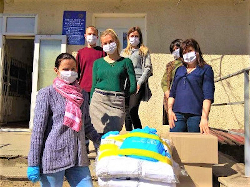
In late April, UN Women Moldova provided personal protection equipment to 3,279 social workers across the country, also supported by Sweden. These included locally produced masks and disinfectant to local 36 social assistance sites across the country. As people are told to stay home, social workers are needed more than ever, especially when it comes to supporting victims of domestic violence. In Moldova, around 80 per cent of workers in the health and social sector are women.
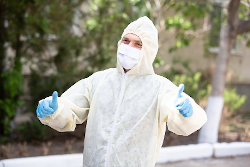
A second lot of Swedish-funded assistance, of 28,000 protective coveralls were donated a week later for social workers in the 36 territorial social assistance structures across the country by UN Women Moldova. This supply of protective equipment, purchased from women-led local producers, supports the efforts of the Ministry of Health, Labour and Social Protection to provide protective equipment to front-line staff of its social assistance system.
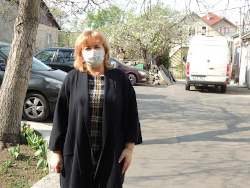
“Social workers and social assistants are hugely important, and I believe that right now they are the invisible people that do a huge amount of work for the society, including for socially vulnerable people, such as the elderly, victims of domestic violence, people with disabilities,” says Tatiana Bucearschi, the Head of Division-General for Social Assistance and Health of Chisinau Municipality, one of the organizations that received the protective equipment. Besides in-person assistance, her team is also working via electronic messages and by phone.
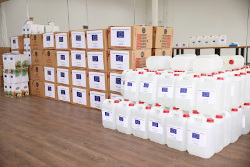
UN Women and UNICEF donated 9,000 litres of disinfectant, 21,500 protective masks, 1,100 pairs of reusable rubber gloves, 90 infrared thermometers, 800 food an hygiene packages and 1,000 sets of educational materials to 70 localities from Cahul and Ungheni districts. The donations were made in early May under a gender equality programme funded by the European Union, to organizations combating gender-based and domestic violence, including violence against children, and to assist vulnerable groups.
In North Macedonia, UN Women is donating non-perishable food and hygiene products to women and families hit hardest
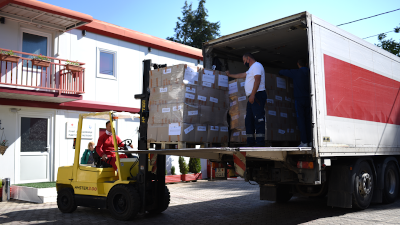
In early May, 1,860 packages of non-perishable food and hygiene products were donated to support those most severely affected by the COVID-19 crisis in North Macedonia. In close coordination with the Ministry of Labour and Social Policy, the packages were delivered to 368 single-parent families, 95 per cent of which are women, as well as 329 registered survivors of domestic violence, shelters and crisis centres for survivors of gender-based violence across the country. The donation was made possible by a UN Women project funded by Sweden and Switzerland.
In mid-May, UN Women also led the distribution of emergency packages specifically for people with disabilities living independently in the Strumica region of North Macedonia.
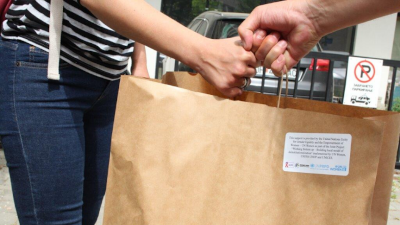
The packages included food, vitamin supplements, hygiene products and protective equipment. Their personal assistants and caregivers, who live in and around the city, also received packages.
“During a pandemic, the marginalized groups of citizens become even more marginalized because it is more difficult for them to achieve their individual rights and needs,” says Elizabeta Bozinoska, Programme Director of CSO HERA, the civil society organization that coordinated the distribution, in partnership with Disabled Persons Organization (DPO) Polio Plus. The organizations are partners under a UN Joint Project on deinstitutionalization, being implemented by UN Women, UNDP, UNFPA and UNICEF, funded by the United Nations Partnership on the Rights of Persons with Disabilities.
In Serbia, UN Women delivers essential products and services, and analyses impacts
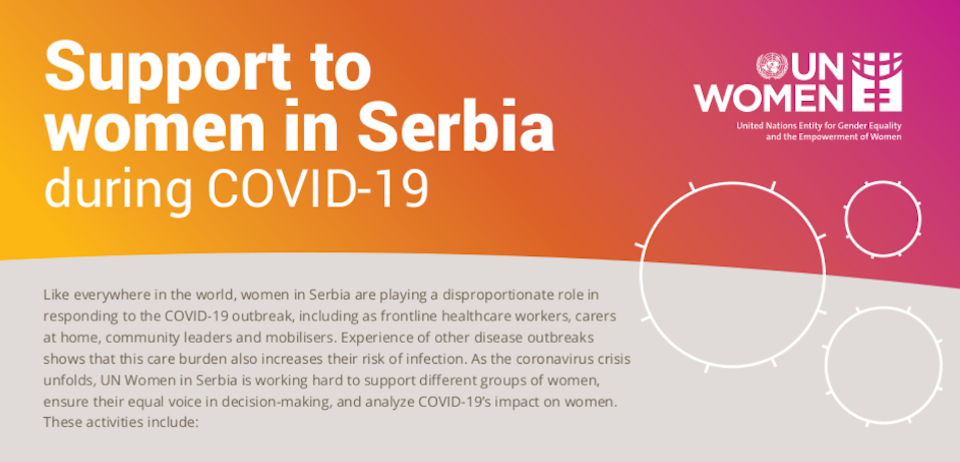
UN Women in Serbia is supporting different groups of women, ensuring their equal voice in decision-making and analysing COVID-19’s impact on women. In the first few weeks of the crisis, UN Women, together with the Social Inclusion and Poverty Reduction Unit of the Government of the Republic of Serbia, secured and distributed hygiene kits and household essentials to 138 women survivors of violence in 11 safe houses across the country. Hygiene kits were also sent to the most vulnerable at-risk groups in 50 municipalities, through an EU-funded UN Women project.
Other efforts include keeping 24-hour helplines open and expanding their online support with 20 civil society representatives through a project funded by Norway; while an EU-funded project has created a safe online environment for chat support and a panic button through a mobile phone app. Mobile teams are helping older women, those living in rural areas and others in need to pay their bills and do other essential tasks, while special phone lines were opened to support overburdened caregivers with psychological support and health information, through a UK-funded project on redistributing unpaid care work. Women farmers from Kolubara district also launched an online green market to reach customers and continue their livelihoods, with support from an EU-funded programme.
To assess COVID-19’s impact on women, UN Women organized Online National Consultations on Gender Equality gathering 40 activists and representatives from women’s organizations from across the country, whose recommendations were compiled as specific actions needed for an efficient and engendered response to COVID-19. UN Women is also supporting work by the governmental Coordination Body for Gender Equality to understand the impact of the pandemic on different groups of women, analysing the economic and livelihood impacts, services for survivors of violence and quality of life. Read the full story here.
UN Women donates hygiene kits for the most vulnerable women in Kyrgyzstan
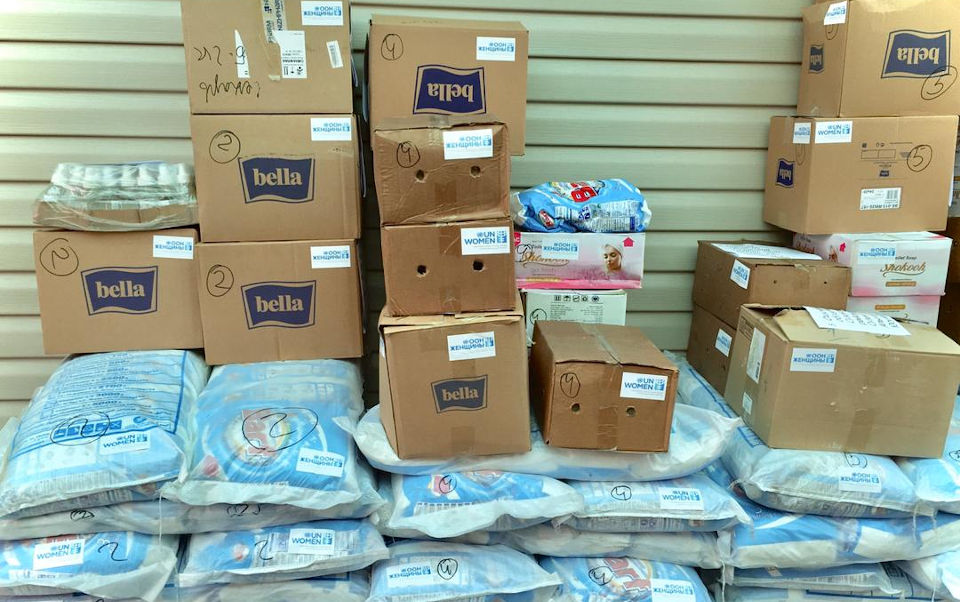
The pandemic has led to an increase in the need for personal hygiene and disinfection products, which are costly for families with limited income. In May, UN Women Kyrgyzstan distributed hygiene kits to 700 of the most vulnerable women and girls in 27 communities across the country. The hygiene kits include cleansing wipes, sanitary pads, reusable face masks, essential hygiene items, liquid soap, sanitizers and detergent, among other items.
“Governmental, commercial and other organizations that provide humanitarian aid to most vulnerable families mainly provide assistance with food packages, and the special needs of women very often remain in the background. These kits give women and girls the opportunity to use their limited funds to purchase other vital resources to meet their basic needs,” said Ulziisuren Jamsran, UN Women Country Office representative in the Kyrgyz Republic.
In April, at the request of women leaders, 16 villages in the Osh, Jalal-Abad and Naryn regions also received humanitarian aid in the form of protective equipment (masks, sanitizers, gloves), cleaning products, children’s and adult diapers and thermometers. In total, more than 2,200 families and 366 employees of primary medical care facilities in rural areas (feldsher-midwife stations), local government offices, checkpoints and hospitals received aid.
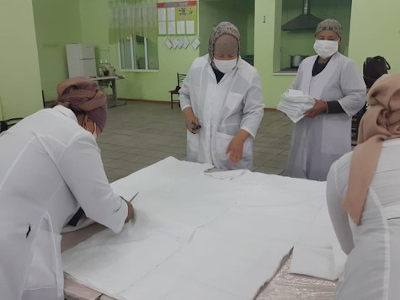
In 10 villages in the Nookat Rayon area of southern Kyrgyzstan, women banded together to address the shortage of masks, sanitizers and other individual protection products. With support provided by a joint programme for rural women – 10 women leaders received hand-sanitizer, gloves, fabric and other accessories that they used to sew face masks from their homes. Women activists then distributed the 5,000 masks they produced in 10 days, gifting them to medical workers, nurses, single mothers, elderly women, pregnant women and mothers on maternity leave.
“It was very important for us, as women, to come up with such initiatives … and contribute to the fight against COVID-19,” said Sanabar Karateva, leader of Association of self-help groups in Apshyr-Ata village.